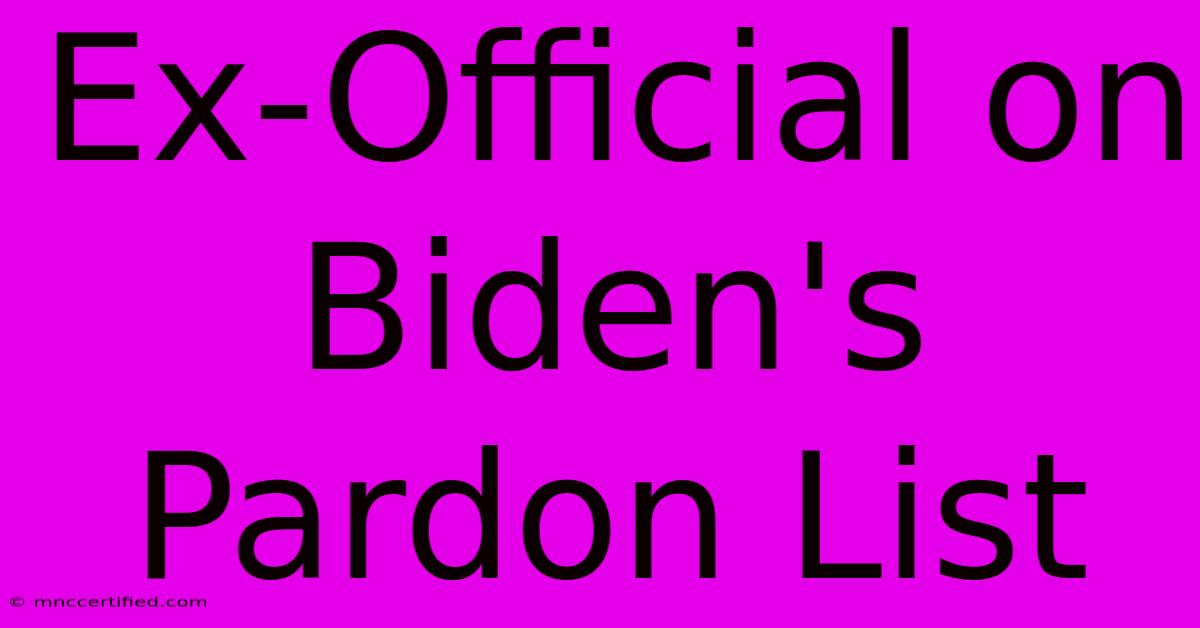Ex-Official On Biden's Pardon List

Table of Contents
Ex-Official on Biden's Pardon List: A Deep Dive into the Controversy
President Biden's use of the pardon power has sparked significant debate, particularly concerning the inclusion of certain individuals on his pardon list. This article delves into the controversy surrounding potential ex-officials who may have received pardons, analyzing the implications and the ongoing discussion surrounding transparency and presidential authority. We'll explore the legal basis for pardons, the criteria potentially used in decision-making, and the broader political context surrounding these controversial choices.
Understanding Presidential Pardons: A Constitutional Power
The power of the President to grant pardons is enshrined in Article II, Section 2, Clause 1 of the U.S. Constitution. This authority is broad, extending to offenses against the United States, except in cases of impeachment. This means the President can forgive a convicted individual's sentence, commute it, or even pardon someone before they're charged. However, this immense power is not without limitations. The pardon power cannot be used to undo a state conviction, and there is ongoing debate about its boundaries and appropriate use.
The Criteria (or Lack Thereof) for Pardon Consideration
While the Constitution doesn't specify criteria for issuing pardons, Presidents typically consider several factors. These can include:
- Nature of the crime: The severity of the offense and its impact on victims are usually taken into account.
- Remorse and rehabilitation: Evidence of genuine remorse, rehabilitation efforts, and a commitment to law-abiding behavior in the future can influence decisions.
- Political considerations: While controversial, political factors—including public opinion and potential electoral implications—can sometimes play a role. This aspect is often the source of considerable criticism.
- Length of sentence served: Many pardons are granted after significant time served, suggesting a focus on rehabilitation and second chances.
The lack of explicit, publicly available criteria for pardon consideration fuels concerns about transparency and potential favoritism.
The Specificity of "Ex-Official" on Biden's Pardon List: Addressing the Unknown
Unfortunately, detailed information regarding any specific ex-officials on President Biden's pardon list is currently limited in publicly available records. This lack of transparency is a key concern. The White House often releases statements about pardons, highlighting the rationale behind certain choices, but often lacks granular detail for privacy or strategic reasons. Accessing this information may require extensive research through official government records and news archives.
Analyzing the Potential Impacts of Including Ex-Officials
The inclusion of ex-officials on a presidential pardon list carries significant weight and ramifications:
- Public trust and perception: Pardons of ex-officials can erode public trust if the rationale isn't clear or if perceived favoritism is involved.
- Legal precedent: The decision-making process behind such pardons can set legal precedents for future administrations.
- Political consequences: These decisions can impact political landscapes, affecting the President's approval ratings and the political discourse surrounding presidential power.
Finding Information and Navigating the Opacity
Obtaining concrete information about specific ex-officials potentially on President Biden's pardon list requires dedicated research. Utilizing official government websites, news archives, and legal databases are critical steps. Key search terms could include: "Biden pardon list," "Presidential pardons 2023," "Biden administration pardons," and combining those with terms like "former official," "ex-government employee," or specific government agencies or positions.
It's crucial to critically assess information found online, corroborating findings from multiple reliable sources to ensure accuracy and avoid misinformation.
Conclusion: Transparency and Accountability in Presidential Pardons
The presidential pardon power is a crucial but controversial aspect of the American political system. Transparency in the decision-making process is essential to maintain public trust. While the President has the authority to grant pardons, clear guidelines and open communication about the criteria used would significantly enhance public understanding and reduce the potential for controversy surrounding the inclusion of ex-officials—or anyone else—on future pardon lists. Ongoing scrutiny and robust public discourse are necessary to ensure responsible use of this significant presidential power.

Thank you for visiting our website wich cover about Ex-Official On Biden's Pardon List. We hope the information provided has been useful to you. Feel free to contact us if you have any questions or need further assistance. See you next time and dont miss to bookmark.
Featured Posts
-
Your Team Vs Plzen Match Winner
Dec 13, 2024
-
Broadcom Q1 Revenue Ai Fuels Growth
Dec 13, 2024
-
How Gukesh Became Youngest Gm
Dec 13, 2024
-
Unintended Consequences Of Good
Dec 13, 2024
-
Elden Ring Nightreign Co Op Spin Off
Dec 13, 2024